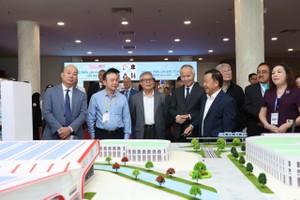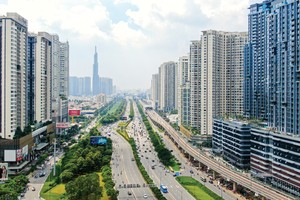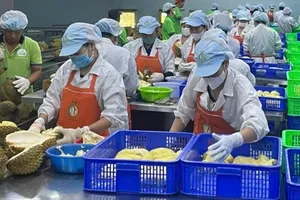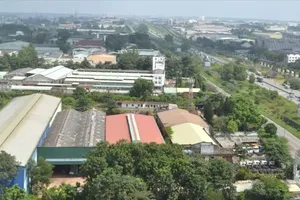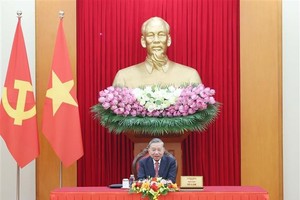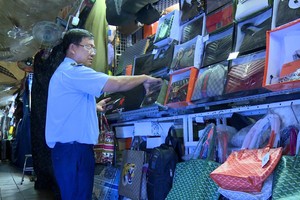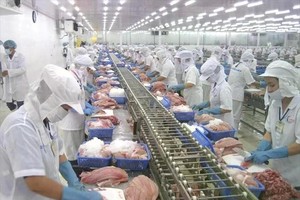Following reviews of Viet Nam ’s economic progression since its admission to the World Trade Organisation (WTO) one year ago, many leading economic managers and experts agree the impact has been positive.
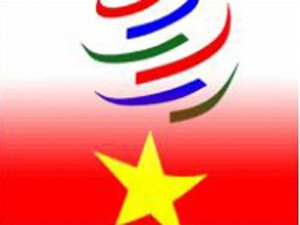
In an interview with Viet Nam Television, the National Assembly’s Committee for External Relations Chairman and former Head of the Vietnamese mission to the WTO, Ngo Quang Xuan, said what Viet Nam has achieved over the past year demonstrate the positive impact of WTO accession.
“ Viet Nam has welcomed more advantages than disadvantages,” Xuan said, using Viet Nam ’s record Foreign Direct Investment (FDI) attraction and export turnovers, and its election as a non-permanent member of the United Nations Security Council for 2008-09, as outstanding examples.
Fetching US$39 billion from exports over the past ten months of this year, Viet Nam ’s total export revenue is estimated to reach US$48 billion for 2007, a year-on-year increase of over 20 percent.
Meanwhile, FDI attraction is estimated at US$13 billion this year following an influx of giant investors and projects. Together with an increase in FDI value, the growing participation of foreign investors in Viet Nam ’s securities market is also a key reason behind the rapid increase of Foreign Indirect Investment (FID) flow into the country.
According to economic experts, the foreign investment sector has benefited most from the “WTO effects”.
Former Director of the Central Economic Research Institute Dr Le Dang Doanh said in a Youth newspaper article that a new wave of investment entered Viet Nam after the country was admitted to the WTO.
International Monetary Fund (IMF) Representative Head in Viet Nam , Houng Lee also said that with its WTO commitments, Viet Nam has earned greater trust from foreign investors.
Lee’s comments were made at a Hanoi seminar on the implementation of Viet Nam ’s investment commitments to the WTO.
At the seminar, European Chamber of Commission Vice President Jean Pierre Achouche said Viet Nam ’s WTO membership has made the country more attractive to foreign investors.
In relation to concrete effects of the WTO on Viet Nam ’s market, Xuan told Viet Nam Television that accession has brought many advantages to Vietnamese, particularly farmers, whose products have enjoyed equal treatment at markets of member countries, leading to increases in both quantity and price of export products.
Opening the market in line with WTO regulations means international markets will have positive and negative influence on Viet Nam , he said.
Many local residents said that after Viet Nam joined the WTO, richer sources of goods have brought more options for local consumers.
However, for the local business sector, the country’s opening market poses challenges due to limitations in competitive competence and the need to compete in a “new situation”.
According to former Deputy Prime Minister Vu Khoan, Vietnamese businesses now have to compete with foreign rivals in an environment where the world economic structure has undergone rapid change and there is a strong knowledge-based economy which are still unfamiliar to them.
Additionally, as all member countries open their doors, the low competitive capacity of Vietnamese businesses creates difficulties.
Viet Nam ’s commitment to opening doors in the services sector has fuelled strong competition in the national market.
Together with finance and banking, the real estate and retail services sectors have become “hotter” as a result of the increased involvement by foreign investors.
Accordingly, former Deputy PM Khoan shares the view with other economic experts that Vietnamese businesses need to equip themselves with comprehensive knowledge, put themselves in the global context and set up coordination networks to improve their competitive capacity.
With the achievements that Viet Nam has made this year, the country’s economic prospect in 2008 and the following years is considered bright.
“The prospect for high growth is realistic,” Dr Doanh told Youth newspaper.
In a report on the Asian economy in 2007, the Asian Development Bank (ADB) forecasted that Viet Nam is likely to reach a Gross Domestic Product growth rate of 8.3 percent this year and the figure may reach 8.5 in 2008 if the country continues with its global economic integration, encourages foreign investment and keeps reforming.
ADB’s Viet Nam Country Director Ayumi Konishi said although the country’s accession to the WTO has not brought miracles, the country’s developing economy is healthy and will continue to develop rapidly

